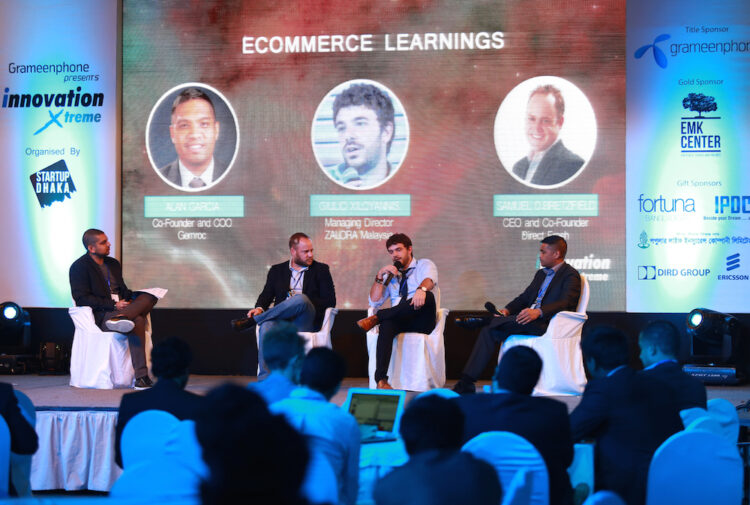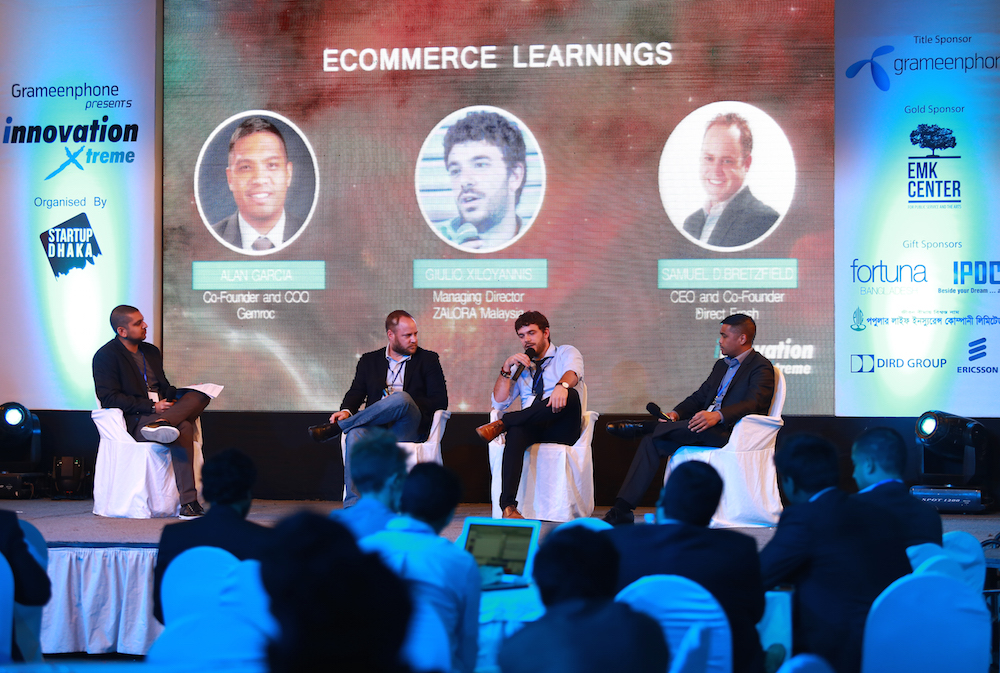Over the last several months, our team has been taking a close look at other ecosystems as we contemplate expansion beyond our New York roots. As part of our research, we are chronicling some of our experiences as we have been fortunate enough to visit a number of ecosystems outside of the Alley.
Fresh off an 18-hour nap, which started with breakfast at Shake Shack (I am going through withdrawal with the Madison Square Park location under renovation) in Terminal 4 at JFK, I landed in Dhaka, Bangladesh via a short layover in Dubai. For this trip, I had the pleasure of speaking at the recent Innovation Xtreme conference. The daylong conference was organized by Startup Dhaka and sponsored by GrameenPhone and the EMK Center.
The central focus of the conference was Innovation in Bangladesh and the opportunities that are available as the country moves into an era where literacy, both digital and literal, is omnipresent. A sampling of participants on the thought-provoking topics include leading investors Jeffrey Paine of Golden Gate Ventures, Dean Matthew of Laxmi Capital; thought leaders such as Zarif Munir of the Boston Consulting Group; domain experts like Vivek Sood, CEO of GrameenPhone, Kamal Kader, CEO of bKash, and Giulio iloyannis of Rocket Internet-backed ecommerce giant Zalora . The entrepreneurial community converged in the largest event of its kind in Bangladesh to examine the potential for the country as it builds its own thriving startup ecosystem.
Dhaka, the capital, is home to 15+million residents. The country itself is the size of Wisconsin and boasts a densely packed population of 160 million – a very large total addressable market. Over the last year, thanks to initiatives like Startup Dhaka, the country has undergone a sweeping transformation, embracing high growth entrepreneurship and shying away from its traditional industrial entrepreneurial roots. Recently, 500 Startups made its first investment in Bangladesh. Last month, Google announced that it would be deploying “the Google Bus” to teach 500,000 students about the internet, visiting colleges across Bangladesh on a 12 month stint – the first of its kind.
In the course of six days, I witnessed a fertile landscape, which, when combined with the right vision, that is on the brink of an explosion.
Where Bangladesh can win…
Ecommerce
Situated a few kilometers from the conference venue is the area of Dhaka called Gazipur, which is home to thousands of garment factories. Bangladesh is one of the world’s largest producers of ready-made garments, responsible for production for leading brands including Hugo Boss, Macy’s, Walmart, H&M, et. al. The garment industry has been the primary driver of the economy for over 30 years, and the next generation of factory owners have built deep domain expertise in not only production, but also supply chain management, derived from their export-driven businesses. As a result, cracking the ecommerce nut seems like the next logical step, especially in terms of fashion. Challenges in the nation involving payments and delivery are quickly being solved and the foundation to support a thriving ecommerce market is being cemented.
Mobile
In the western world, there is a conscious push to adapt a mobile-first mentality. However, our iPhones and other smartphones are really another set of toys that provide us with information on the go. In the developing world, and in countries like Bangladesh, the phone often represents the only means to connect to the world for millions. Therefore, fundamentally, the mobile phone is looked upon differently and the innovation possible by entrepreneurs in this part of the mobile landscape comes from a place of necessity rather than of luxury. This resource-constrained mentality will foster innovation in mobile in the developing world beyond the often trivially focused CandyCrushes and SnapChats we have all come to love hate.
At the forefront of mobile innovation in Bangladesh sits GrameenPhone (GP), a joint venture between Telenor, a Norwegian telecommunications provider, and an affiliated entity of Grameen Bank, one of the pioneering organizations in microfinance, led by Nobel Laureate Mohammad Yunus. Grameen Phone is currently the largest mobile carrier in country, with over 50 million subscribers. GP has embedded itself into the local community beyond what a traditional Western provider would by fostering groundbreaking programs to leverage mobile connectivity in healthcare, payments, information centers, and a number of other verticals. As the next phase of mobile and internet penetration includes incorporating a significant illiterate population into the customer mix, GP is working hand in hand with local Bangladeshi entrepreneurs to incubate a number of early stage initiatives to solve this challenge.
During my trip, I had a chance to visit the GP headquarters and the complex seems the closest thing to a Silicon Valley-type campus in Bangladesh, housed in a massive and quite impressive structure that screams innovation. I also had the opportunity to visit the control room, which is a command center for the company’s entire operations and a sight to see. Unfortunately, due to the sensitive information being displayed in room, no photography is permitted. During the meeting, I learned of Grameen’s aggressive plans for expansion of its market penetration in the country and it is very encouraging to see that Grameen considers cooperation with local entrepreneurs to be of paramount importance in its strategy to realize its goals.
The Startups
In addition to my discussion on media and workshops on the NYC ecosystem and how to pitch to the press, I had the opportunity to serve as a judge alongside distinguished investors and key luminaries, including the US Ambassador to Bangladesh, Dan Mozena. The Lightning Round Pitch competition showcased 10 Bangladeshi startups of which I found three that I feel exhibit considerable potential:
Bongo
Bongo is the Netflix of Bangladesh. With established content partnerships that have led to the creation of a library of over 25,000 pieces of on demand video content prior to launch, Bongo is poised to disrupt the market in Bangladesh where there is a dirth of basic entertainment options for the growing middle class. Combined with the expertise of the founding team – all established entrepreneurs – Bongo is well positioned to scale, as internet connectivity spreads through the nation and the surge of Bangladeshi diaspora abroad continues.
Zuum Zuum
Founded by an ex-Groupon veteran who returned to Bangladesh with domain expertise from the UK and Australia, Zuum Zuum is a lifestyle ecommerce platform that will provide high quality products at reasonable prices throughout the South Asian market.
Buckets Engineer
Buckets Engineer is an online learning platform that is directed towards the needs of autistic children and those with other learning disabilities. The founder delivered a clear, crisp pitch outlining the market, the size of the opportunity, and the business model. While I think the market in Bangladesh may be narrow for this venture, I do think this startup has significant upside potential on a global scale.
My overall impression is that the Bangladeshi ecosystem is developing quite rapidly, although it is still in its infancy. Capital is flowing into the market as two Bangladeshi-specific funds were announced during my visit, including Startup Dhaka’s own $2M fund and accelerator. Fenox, a Valley-based VC firm, also announced its plan for a $200M Bangladeshi-focused fund.
While the startup ecosystem in Bangladesh is undoubtedly on the rise, as it is all over the world, it does not come without challenges that are limiting its growth, including infrastructure, broadband connectivity, and government instability. However, the entrepreneurial community is coming together to proactively address these concerns, and progress is being made daily.
One thing is for sure: in a nation of 160 million people densely situated, to a large degree, in the capital city, you will be waiting a while for an elevator. Better make sure your elevator pitch is ready to go. You never know how long that elevator ride will be. Or who else might be along for the ride up…
To learn more about Bangladesh and the startup scene there, the team at StartupDhaka put together this video showcasing some of the opportunity in Bangladesh:
Special thanks to the Samad Miraly, Mustafizur Khan, Fayaz Taher, and the entire Startup Dhaka team for their immense hospitality during my trip. A thanks also goes to the EMK Center and the US State Department whose incredible support of the conference allowed myself and a number of US-based speakers to attend the event.




